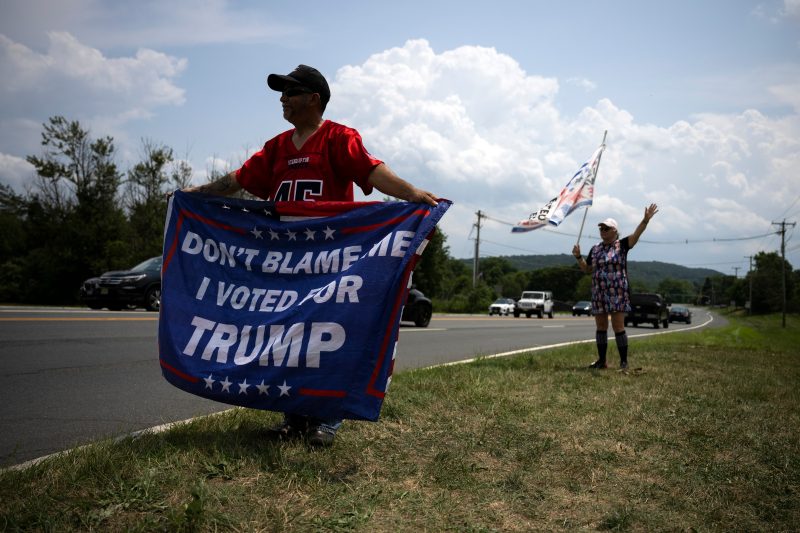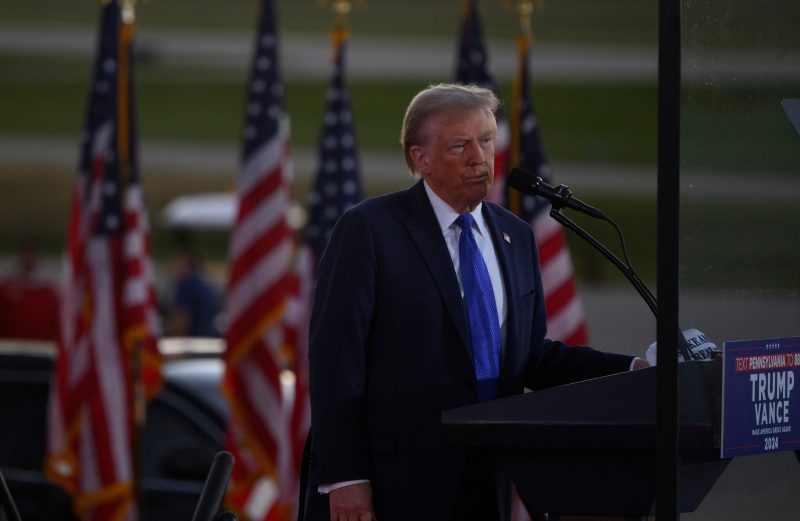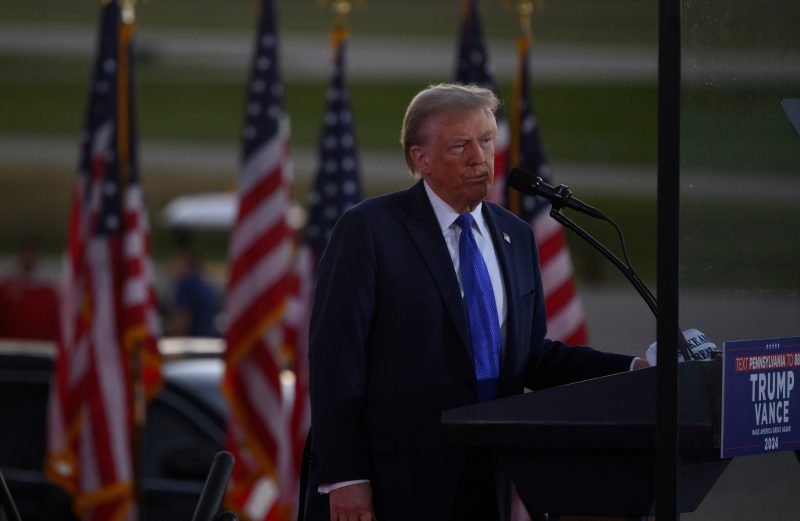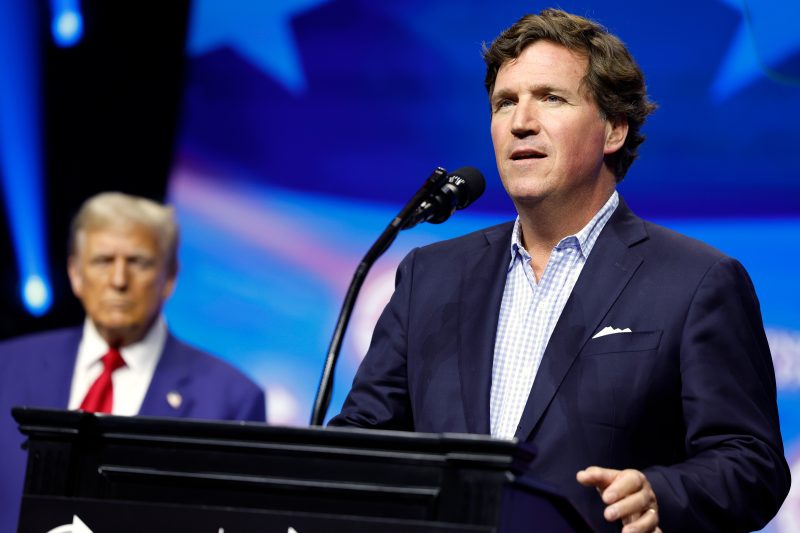
America’s grievance-fueled politics poised to continue after Trump shooting
America’s political leaders described the 2024 presidential election as a life-or-death crucible long before a man opened fire at Donald Trump’s rally in Pennsylvania, wounding the former president and killing a supporter.
Since then, Trump’s allies have moved quickly to blame liberals and the media for the would-be assassin’s actions, before any public evidence of his motivations. Biden’s campaign has pulled its advertising and events but remains committed to a fiercely negative campaign that casts Trump as a threat to basic freedoms and the American system of government.
The result is a nation on edge, two presidential efforts poised to spend $1 billion on advertising to demonize each other and 112 days until the polls close.
“This country over the last several years has gone from being polarized to being polarized and radicalized,” said Michael Jensen of the University of Maryland’s START consortium for terrorism research.
The former leads to gridlock, he explained, the latter to violence.
“It’s reasonable for us to express outrage. It’s reasonable for us to call for unity. It’s reasonable for us to denounce these types of acts,” he said. “I don’t know that it’s reasonable for us to act surprised.”
Investigators said they had no information Sunday about the motives of the shooter, whom they identified as a 20-year-old with no known history of violence, little to no social media profile and no significant involvement in political causes. Authorities said his bullets had killed a man in the crowd and injured others, including Trump, whose ear was bloodied.
The tenor of the campaign trail had been transformed long before the shots rang out Saturday in Butler, Pa. Gone are the soapbox saws about “our children’s future” and “the most important election of our lifetime” that punctuated U.S. elections for decades.In their place have been dire warnings of doom should the other side prevail.
“Donald Trump is a genuine threat to our nation,” Biden’s campaign announced weeks ago, before a Supreme Court decision on immunity that the president’s campaign declared would allow Trump to “become the dictator that he promised to be on day one.”
Trump has encouraged violence against protesters at his own rallies and calls those who were convicted ofparticipation in the 2021 attack on the U.S. Capitol “hostages.” He has described his political opponents as “vermin” and warned that the nation would face terminal decline during a second Biden term. “If he wins this election, our country doesn’t have a chance,” Trump said at the June debate with Biden.
Prominent Democrats have been nearly universal in condemning Saturday’s shooting, and both sides have expressed a desire to be more careful with their rhetoric over the coming days.
“Unity is the most elusive goal of all, but nothing is important than that right now,” Biden said in a White House statement Sunday, after meeting with his team investigating the shooting. “We’ll debate, and we’ll disagree. That’s not — that’s not going to change. … We’re going to not lose sight of the fact of who we are as Americans.”
Trump has told his team to focus programmingfor the Republican National Convention, which begins Monday, on a theme of “unity.” His advisers have suggested to speakers a need to “dial it down, not dial it up,” according to a person who has spoken with Trump and who spoke on the condition of anonymity to discuss private conversations.
But grievance remains the dominant currency of American politics — the conviction that one side has been victimized by the other. There was little evidence on Sunday that calls for greater understanding across party lines had filtered down to the grassroots — or that any softening of divisions would last.
Bob Branch, a GOP delegate fromArizonawho is running for a seat on Maricopa County’s governing board, spoke with a shaking voice about the shooting beforehe boarded a flight Sunday to the Republican convention in Milwaukee.
“If you look at the media all these visceral ads that Biden is running — that Trump’s a dictator, that he’s Xi, that he’s Putin’s puppet. You see all that, there’s no wonder why someone doesn’t get amped up and try to kill him,” he said. “Biden can’t beat him any other way.”
David Lara, a Republican delegate from the Arizona border town of San Luis, also put the blame squarely on Biden. “He’s preaching one thing, and he did totally the opposite,” Lara said. “That causes people like this person to do something like this. Joe Biden doesn’t have a leg to stand on — he did what he’s accusing other people of doing, and he should have known better.”
A YouGov survey conducted Sunday described the contours of a rattled nation. Two out of every three respondents said the current political climate makes violence more likely, while 8 out of 10 said political violence is a problem.
The share of Americans who support the use of force for political ends remains much smaller. One research project by the Democracy Fund found that 2 percent of Democrats and 4 percent of Republicans consistently justified violence for political ends in surveys between 2019 and 2022. More than 8 in 10 Americans said violence for political goals was never justified.
Whether rhetoric fromcandidatesorcampaignsdirectly influences violent acts is a more complicated question.
The man who attacked then-House Speaker Nancy Pelosi’s husband with a hammer in 2022 testified at his trial about several right-wing conspiracy theories, saying that he spent up to six hours a day watching political commentary on YouTube before the attack.
The man who shot President Ronald Reagan in 1981 saidhe aimed to impress a Hollywood actress. The 22-year old man who shot Rep. Gabby Giffords (D-Ariz.) in 2011 was later diagnosed as a paranoid schizophrenic. One of the two attempts on President Gerald Ford’s life in 1975 was committed by a woman who had been a follower of cult leader Charles Manson.
Robert A. Pape, a professor of political science at the University of Chicago, has been studying political violence for decades and surveying Americans on the topic for four years. His research finds little direct correlation between social media use and support for the use of force to achieve political ends, since most people still get their news from major news organizations. He argues that a deeper upheaval is gripping the country, turning policy debates into more existential contests.
“What is underlying this are more likely major divisions about where the country should go,” he said. “We are in the next 10 years about to go from a White-majority democracy to a multiracial democracy.”
Those tensions, he said, drive the divisive rhetoric around racial justice and immigration that animates much of this year’s presidential contest. Policy disputes are often no longer about policy but the fundamental character and foundation of the country.
“There is this feeling that this is a divide about what America means, and we don’t have a love for the institutions that we used to,” presidential historian Douglas Brinkley said.
Biden supporters have focused on rhetoric from the right, like a quote from Kevin Roberts, the head of the Heritage Foundation think tank, who said in a statement in early July that the nation is “in the process of the second American Revolution, which will remain bloodless if the left allows it to be.”
Roberts said he has “made clear that patriotic Americans were committed to a peaceful revolution at the ballot box, but the Left may commit violence to stop them.”
Trump’s supporters have focused on Biden’s own rhetoric. After what many analysts and critics called a disastrous debate performance, Biden spoke to donors last week about the need to change topics and “put Trump in the bull’s eye,” before going on to describe the policy contrasts he would make.
Roberts said that sort of rhetoric has “now led to murder and grieving families.”
The Biden campaign said in a statement that “in a moment when Americans should come together and unite to condemn this horrifying attack, anyone — especially elected officials with national platforms — politicizing this tragedy, spreading disinformation, and seeking to further divide Americans isn’t just unacceptable — it’s an abdication of leadership.”
What concerns those who study political violence is that the public tensions and fighting have a way of filtering into deluded and unstable minds, indirectly leading to violence.
“This isn’t ‘random,’” Elizabeth Neumann, who served as a senior Homeland Security official during the Trump administration, wrote on X about Saturday’s shooting. “We are swimming in a toxic soup of grievance, anger, constant outrage and fear — this milieu directly contributes to people concluding that violence is somehow justified.”
There is little indication that an attempt on the life of a former U.S. president and the presumptive Republican nominee will change that recipe anytime soon.
But in a best-case scenario, researchers hope it forces people to reconsider their behavior.
“This is a reckoning for political leaders and for ordinary Americans,” said Cynthia Miller-Idriss, who leads the PERIL extremism research lab at American University. “It’s a moment when everyone should be thinking about the role they play in escalating the potential for violence.”
Wingett Sanchez reported from Phoenix. Josh Dawsey contributed to this report.



